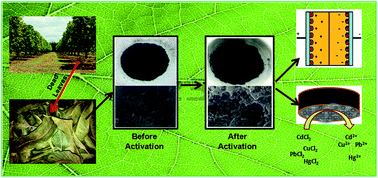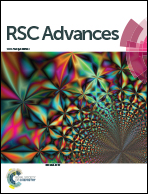Eco-friendly synthesis of activated carbon from dead mango leaves for the ultrahigh sensitive detection of toxic heavy metal ions and energy storage applications†
Abstract
A novel spherical carbon nanoparticle decorated activated carbon (SNAC) material with a high surface area of about 1555 m2 g−1 is prepared from the dead mango leaves by an eco-friendly method for the detection of toxic heavy metal ions and energy storage applications. The limits of detection (LODs) for the determination of Cd(II), Pb(II), Cu(II), and Hg(II) ions at the SNAC-modified GCE are 24.4 × 10−9 M, 5.7 × 10−9 M, 23.2 × 10−9 M and 24.6 × 10−9 M, respectively. On the other hand, the obtained maximum specific capacitance for the single electrode from galvanostatic charge discharge is 478 F g−1 at 1 A g−1. The symmetric supercapacitor cell provides a higher specific capacitance (SC) of 55 F g−1 at 1 A g−1, and energy density of 10.75 W h kg−1 at a power density of 300 W kg−1.


 Please wait while we load your content...
Please wait while we load your content...